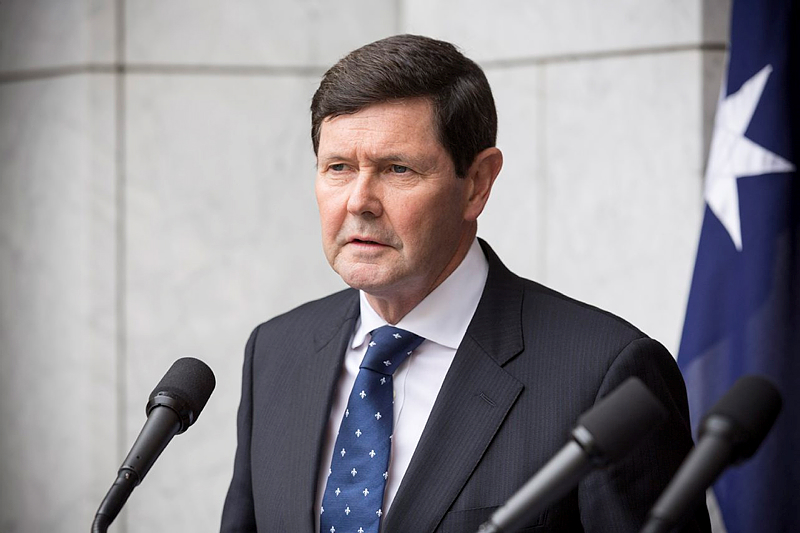This week’s Sea State will examine some of the more prominent debates to arise from Australia’s Future Submarine Summit, the most recent forum to hold informed discussion on the trajectory of SEA 1000: the largest defence project in Australia’s history.
The Sub Summit took place on 25 and 26 March in Adelaide, South Australia. A lot of the debate revolved around the build location and the relative advantages of local construction versus offshore sourcing—effectively the contenders for the now-infamous ‘competitive evaluation process’.
That the process has become politicised as was evident from the competing views and priorities put forward by Defence Minister Kevin Andrews and Opposition Leader Bill Shorten. Shorten called for the Government to support their ‘bipartisan’ approach of an acquisition process that would include reinstating Sweden, as well as France, Japan and Germany, along with the firm commitment to build the submarine fleet in Australia. Andrews’ response was that Shorten was ‘promising a complete fantasy’, following with:
I’ve set out the process…we are in that process now and we are getting on with the job because we cannot afford to have a capability gap so far as our Defence needs in the future are concerned.
In his opening address, Andrews stated that the Australian naval ship building industry has been left in a ‘precarious and uncertain’ state. He followed this by maintaining that the ‘valley of death’ for the industry ‘could have been avoided’—which is interesting for its implication that it’s now inevitable. The valley of death has previously been used in the rhetoric of politicians and journalists to describe the loss of jobs and skills in the Australian ship-building industry when it’s in between projects.
However, while party bickering made headlines, Hans Ohff—ASC’s former CEO—made a compelling argument for politics to stay out of shipbuilding altogether. He put himself firmly in the local build camp, and asked why ‘anyone would even contemplate anything other than building and maintaining’ the future submarine fleet in Australia. In his view, there’s an uncertain future for national security, if Australia can’t lock in the ability to ‘maintain, repair, upgrade and, when required, rapidly expand the future submarine fleet’.
Rear Admiral Peter Briggs continued with this theme by calling the potential for the build to take place anywhere else a ‘significant national disaster’ (echoing the case he made here and here on The Strategist). That was also the view of another former ASC CEO, Steve Ludlam. Briggs also spoke on the benefits of the government considering a formal project definition study involving two contenders after the competitive evaluation process between Germany, France and Japan, arguing this would achieve the best capability and best price.
The Japanese delegation at the conference highlighted the capabilities and difficult operating environment of the Soryu class and did not rule out the prospect of building in Australia, should Japan win the contest.
The defence Minister also announced the creation of an expert advisory panel (former DMO chief Warren King is viewed as likely to head the panel) to ensure accountability in the competitive evaluation process, which raised some eyebrows amongst senior industry representatives present at the summit. Although Head of DMO Harry Dunstall reiterated that ‘all potential international partners are to be treated fairly’ throughout the process, concerns that the current evaluation process favoured Japan were echoed throughout the two days.
However, word at the conference was that the process may take significantly longer than ‘at least’ ten months, which Andrews mentioned in his speech. And it seems that the competitive evaluation process is not the only agenda item expected to lag. The 2015 Defence White Paper, originally expected to be released in early 2015, has now been pushed back to the second half of the year and is expected in August. As outlined by the Minister, the possibility of a South Australian build will remain ‘subject to the outcomes of the Defence White Paper’ – as will more clarity about the size of our future submarine fleet.
As far as the ‘Option-J’—a Japanese submarine—is concerned, ASPI’s Andrew Davies and Benjamin Schreer make the point that the competitive evaluation isn’t an apples-versus-apples contest. While they note that there are many uncertainties regarding capability and industry aspects, their new ASPI report (PDF) makes the case for a stronger strategic dimension involved in acquiring Japanese submarines than the European alternatives.
Finally, while submarines were the focus of last week, the ASPI’s Future Surface Fleet conference begins today at the Hyatt Hotel in Canberra. An exceptional line-up of industry leaders will debate the potential build location, design options and international design contenders for the SEA 5000 project. Be sure to follow the conference by following @ASPI_org on Twitter, and by using the hashtag #FSFleet15.


